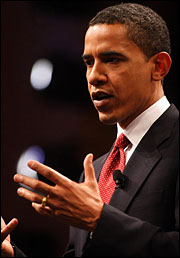New Year’s Day is not, I suppose, everyone’s idea of the best time to receive a sobering message. But like it or not, this year it happened to me.
The message that popped into my inbox, unannounced and unexpected, would have brought even the most hungover dreamer smartly back to reality. “Today,” it opened uncompromisingly, “is arguably the first day of the most important year in human history.”
That “arguably” signaled the author’s nationality. And being a Brit like me, he could not leave it at that, adding immediately: “I dislike the grandiose, so the previous sentence was written reluctantly.” But he was not deterred for long, explaining that the international conference to set a new treaty to combat climate change, set for December in Copenhagen, “will do more to shape human destiny for longer” than any previous meeting in the history of the world.
The authorship commanded attention. Prof. Tom Burke served as one of the closest advisers to three successive British environment ministers in the 1990s, and remains one of Europe’s most respected green commentators. Once perhaps Friends of the Earth UK’s most effective leader, he now advises Rio Tinto — a nice irony, since his first big campaign was against plans by the company to strip mine in a Welsh national park. But it’s fair to say that the mining multinational has changed much more than he has.
I digress… The point is that Tom sat down bright and early on New Year’s morning to share his evaluation of the year with a few friends. The other addressees included: John Podesta, at that time the head of Barack Obama’s transition team; John Ashton, Britain’s Climate ambassador; Sir Jeremy Greenstock, a former U.K. ambassador to the United Nations; and a host of senior government officials in Europe and the United States.
The reason for 2009’s unique importance, he explained, is that “climate change is forever. Terrible though the consequences of war and recession are, they pass. But the nature of the climate is such that the future cannot redeem today’s mistakes.”
He added; “We have one chance to reach a political agreement to reduce carbon emissions in time to stay safe. This is the year in which we take that chance.”
Tom urged us to pass on his e-mail. I was so impressed that I persuaded the editor of the Independent on Sunday, for which I work as environment editor, to run an op-ed article adapted from it. It struck quite a chord with our readers.
In a sense, though, Tom’s year truly started at the weekend, for on Sunday the countdown to Copenhagen began in earnest. Representatives of the world’s nations are in Bonn to try to hammer out the shape of the deal to be put on the table in Copenhagen late this year. They will have to cover a lot of ground in their two weeks’ talks, because under the rules of the negotiations, a draft treaty has to be ready to go out to governments by the beginning of June.
Yvo de Boer, the phlegmatic Dutchman in charge of the negotiations, is already concerned that time is running out. “Worrying”, he replied the other day when asked to describe the state of play. “I’m not concerned about willingness to get the job done, I’m concerned by the amount of time left.”
That willingness has, of course, been transformed by the arrival of Barack Obama in the White House and by what — on this side of the Atlantic at least — is the new administration’s unexpected degree of commitment. Even de Boer remarks on the Obama team’s “huge enthusiasm to get moving on the issue.”
But that’s part of the problem. Europe has been waiting — waiting for Obama. And while the continent’s leaders have been treading water, the current has been carrying them steadily backwards. Europe may still have the world’s most ambitious targets for reducing emissions by the crucial date of 2020 — 20 percent of 1990 levels, rising to 30 percent if other rich nations join in — but it has been steadily watering down its commitment since the global financial crisis took hold. Having been out in front for so long, Europe seems to be preparing to cede the leadership to the United States, instead of vying with it to take the action so urgently needed.
Tom Burke — who feared even at the beginning of the year that success at Copenhagen would be “elusive” — is even more concerned nearly three months later. But he feels that the most important moment will come later this week, at the G-20 summit in London. The key will be, he says, whether the G-20 leaders will take “the unique opportunity” of the unprecedented economic stimulus packages their nations have enacted to tackle climate change and build green economies.
And he fears that if they fail to devote at least half of the money to the task “we will be on a downward slope for the rest of the year”.


